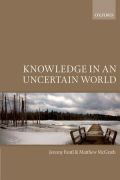
Fantl and McGrath explore the relation between knowledge, reasons, and justification. They argue that you can rely on what you know in action and belief, since what you know can be a reason you have and you can rely on your reasons.But the assumption that knowledge allows for a chance of error makes this a controversial position in epistemology. Knowledge in an Uncertain World is an exploration of the relation between knowledge, reasons, and justification. According to the primary argument of the book, you can rely on what you know in action and belief, because what you know can be a reason you have and you can rely on the reasons you have. If knowledge doesn't allow for a chance of error, then this result is unsurprising. But if knowledge does allow for a chance of error - as seems required if we know much ofanything at all - this result entails the denial of a received position in epistemology. Because any chance of error, if the stakes are high enough, can make a difference to what can be relied on, two subjects with the same evidence and generally the same strength of epistemic position for a proposition candiffer with respect to whether they are in a position to know.In defending these points, Fantl and McGrath investigate the ramifications for debates about epistemological externalism and contextualism, the value and importance of knowledge, Wittgensteinian hinge propositions, Bayesianism, and the nature of belief. The book is essential reading for epistemologists, philosophers who work on reasons and rationality, philosophers of language and mind,and decision theorists. INDICE: Introduction Fallibilism Contextualism Knowledge and Reasons Justification Belief The Value and Importance of Knowledge Infallibilism or Pragmatic Encroachment? Conflicts with Bayesian Decision Theory? Does KJ entail infallibilism? Glossary Bibliography
- ISBN: 978-0-19-969467-9
- Editorial: Oxford University
- Encuadernacion: Rústica
- Páginas: 262
- Fecha Publicación: 24/11/2011
- Nº Volúmenes: 1
- Idioma: Inglés
